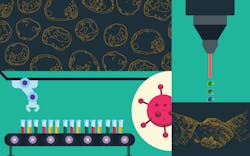NIST launches its Flow Cytometry Standards Consortium
Recognizing that standards and measurements are needed to support the discovery and manufacture of cell and gene therapies for use in previously untreatable diseases, the National Institute of Standards and Technology (NIST; Gaithersburg, MD) is launching the Flow Cytometry Standards Consortium. The consortium, which will kick off with a virtual workshop on February 16 and 17, 2021, will convene stakeholders in the healthcare and biotechnology communities to solve common measurement problems related to this technology.
Flow cytometry, which measures the chemical, physical, and biological characteristics of cells and constituents of cells, is widely used in the characterization and testing of advanced therapies, including cell and gene therapy products. It is a critical tool in clinical diagnostics, vaccine and drug development, cancer research and diagnosis, and other areas of the biosciences and biotechnologies. There are challenges, however, in lack of reproducibility, and therefore comparability, of results from flow cytometry, so the NIST consortium will aim to develop measurement assurance strategies and standards to promote broader quantitative applications of flow cytometry.
NIST offers deep expertise in fluorescence measurement and has been supplying high-accuracy measurements to the community for nearly 20 years. It also has built a measurement infrastructure for deep characterization of cells using multi-omics technologies, such as genomics, transcriptomics, and proteomics.
